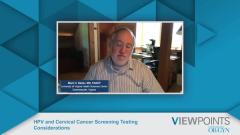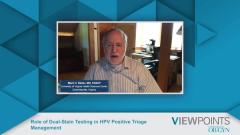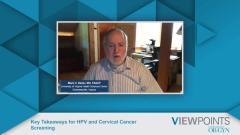
Addressing the Impact of HPV Vaccination Uptake on Cervical Cancer Screening
Drs Sangini S. Sheth and Mark H. Stoler share their thoughts on the adoption of primary HPV screening and how they foresee changes to cervical cancer screening as more individuals get vaccinated.
Episodes in this series

Dr Thomas C Wright Jr: Let's move on now to recent advances in screening and looking ahead. How do you all foresee cervical cancer screening guidelines changing as more HPV-vaccinated individuals reach the screening age? Do you think this is just going to get more as time goes on as our vaccination rates increase? Dr Sheth?
Dr Sangini S. Sheth: I think we may see more interest in the adoption of primary HPV screening so a change in the modality of screening. Two, as we have increased screening rates, we could see the intervals shift and we could see the age change of initiation of screening. It's hard to predict right now because the vaccine has been available to us for over 15 years, and we're still so far from that optimal vaccination rate that it's hard to know when we're going to get there.
Dr Thomas C Wright Jr: What is your feeling about why we're so far from the optimal vaccination rate?
Dr Sangini S. Sheth: I think there are a few factors at play. The vaccine has some bad press that is not founded in any science or evidence in terms of side effects. Then there's just a lack of understanding that it is a vaccine and therefore it should be offered and recommended to everyone, so there's often this [attitude of], “Well, who needs it.” Trying to assess risk where, like any preventative measure, the point is for everyone to get it. I think those 2 issues combined have made uptake challenging.
Dr Thomas C Wright Jr: Not surprising. We have vaccine hesitancy in the United States given what we've seen with COVID. Dr Stoler, would you address this issue of the performance of HPV testing vs cytology in vaccinated populations?
Dr Mark H. Stoler: Sure, but I want to make a quick comment to what was just said. There's a study that was just published. It was in many of the newspapers last week out of Virginia, where they found that 25% of the population haven't even heard of the HPV vaccine. This is 15 years after FDA approval that every pediatrician and family practice doc should be vaccinating their teenagers and 25% of adults have never heard of it.
Dr Thomas C Wright Jr: Sure, Mark. There's been a lot of discussion about the performance of cytology vs HPV as we get more people vaccinated.
Dr Mark H. Stoler: As I said, screening performance is driven by prevalence. HPV vaccinated individuals with Gardasil 9 have a 90% decrease in the rates of infection for the 7 types that cause 90% of all cervical cancers. In those individuals, the only thing that will work is the more sensitive HPV test. I think in this conversation, whether you're doing cotesting because that's what's available or primary HPV, the important thing is if you're going to screen, you have to do HPV testing. Now, as the vaccination goes through the population, the prevalence will drop particularly the prevalence of the most important HPV types. What you'll see is decreasing rates of HPV in vaccinated individuals and decrease in screen positives, and the first things that will drop out are the most important drivers of cancer screening, which are the most high-risk type 16 and 18 that account for 70% of cervical cancer. Lower sensitivity tests like a Pap [Papanicolaou test] will just perform less and less. It's not only less sensitive. It becomes increasingly less specific. We know that most abnormalities on Pap are already nonspecific ASCUS [squamous cells of undetermined significance] cases. When we take ASCUS out, the performance of Pap testing is quite poor. Yet the meaning of those ASCUS cases for the types that are not included in the vaccine becomes less and less specific. Vaccinated populations will be ahead of the game in that their risk of precancer is decreased by almost 90% or more. They still need some screening for a while until the overall population prevalence drops and that screening has to be molecularly based with HPV.
TRANSCRIPT EDITED FOR CLARITY
Newsletter
Get the latest clinical updates, case studies, and expert commentary in obstetric and gynecologic care. Sign up now to stay informed.

















